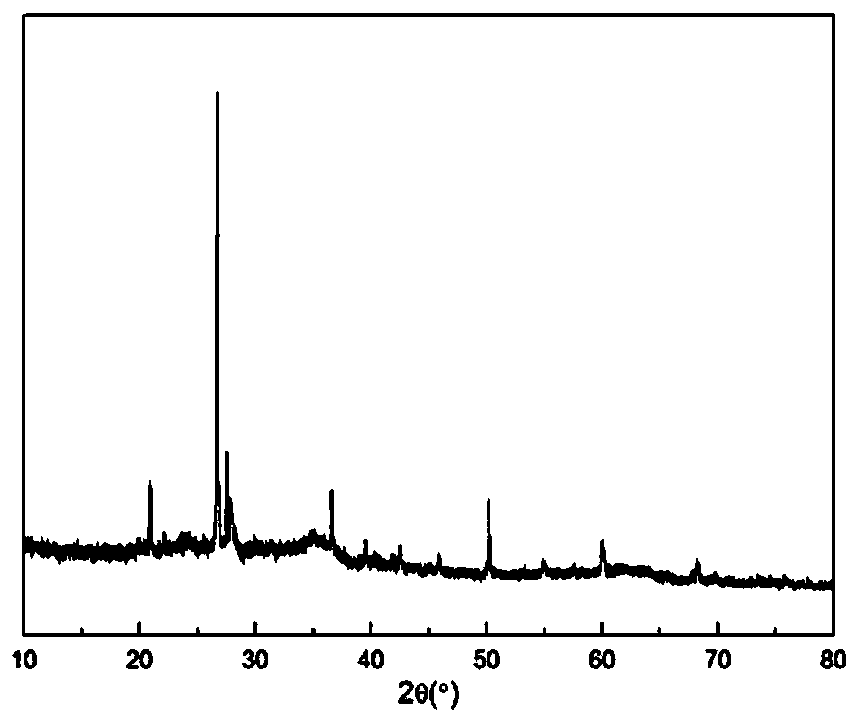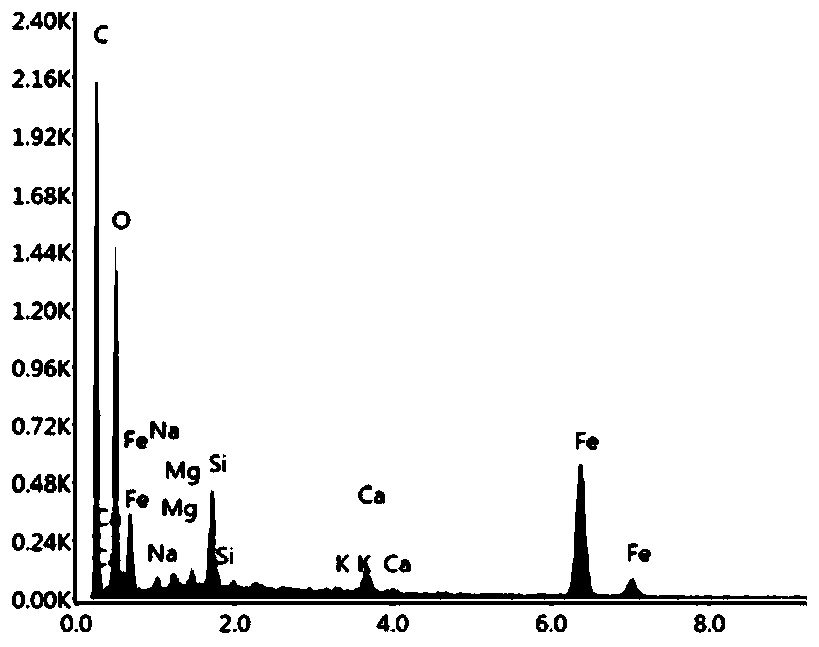A carbon-based composite material for remediation of arsenic and cadmium contaminated soil and its application
A technology for cadmium-contaminated soil and composite materials, applied in the field of carbon-based composite materials, to achieve stable performance, improve the effect of reducing soil total nitrogen or alkaline nitrogen content, and increase N element content
- Summary
- Abstract
- Description
- Claims
- Application Information
AI Technical Summary
Problems solved by technology
Method used
Image
Examples
Embodiment 1
[0029] Prepare carbon-based composite material of the present invention
[0030] (1) Chop the wheat straw into small pieces of about 4 cm, wash and air-dry naturally, put it into a vacuum tube furnace for pyrolysis, the final temperature of pyrolysis is 400°C, keep it warm for 1.5h, take it out, and let it cool naturally to room temperature. The obtained straw biochar is passed through a 0.5mm sieve;
[0031] (2) Accurately weigh 16.16g of analytically pure Fe (NO 3 ) 3 9H 2 Add O reagent to a glass beaker, add 100mL deionized water to dissolve completely, stir evenly, and obtain a 0.4mol / L iron salt solution;
[0032] (3) Weigh 10g of sieved biochar, add it to the prepared iron salt solution, and place it on a magnetic stirrer to stir continuously. At this time, the pH value of the solution is about 1.7-1.9, and then add 5mol / L NaOH solution, so that the final pH value is stable at 7.00±0.02, and stand at room temperature for 24h;
[0033] (4) Use a vacuum filter bottle ...
Embodiment 2
[0036] Adsorption performance of carbon-based composites on As and Cd in water
[0037] Weigh 0.10 g of the carbon-based composite material prepared above into a 50 mL centrifuge tube, add 40 mL of As(III) or Cd simulated wastewater solution with an initial concentration of 1, 5, and 10 mg / L, respectively, and add 0.01 mol / L NaNO 3 The solution is used as a supporting electrolyte, and the pH of the solution is 0.01mol / L NaOH or HNO 3 The solution was adjusted to 5.8±0.2, shaken at room temperature for 24 hours, and after centrifugal filtration, the concentrations of arsenic and cadmium in the supernatant were measured. The results show that the carbon-based composite material prepared by the present invention has a good removal effect on As and Cd in water, and the removal efficiency is 92.1%-98.4% and 96.0%-97.1%, respectively, and the maximum adsorption capacity can be reached within 4 hours More than 95% of the adsorption reaction is relatively rapid. Through model fittin...
Embodiment 3
[0039] Remediation of Arsenic and Cadmium Contaminated Soil by Carbon-Based Composite Materials
[0040] As and Cd composite polluted soil was collected near the mining area, in which the Cd content of the soil was 31.3 times that of the national soil environmental quality secondary standard (GB 15618-2008), and the As content exceeded the standard by 1.3 times. Set the addition amount of carbon-based composite materials to 1% (w / w), which is approximately equivalent to 22.5t / hm of field application amount 2 . The soil and the carbon-based composite material were fully mixed and placed in plastic pots, sealed with plastic film, and a number of small holes were made to ensure the free circulation of air inside and outside the pot. Add deionized water regularly to keep the water content at 70% of the maximum field water holding capacity of the soil, and cultivate at room temperature for 30 days.
[0041] The results showed (Table 1) that after applying carbon-based composite m...
PUM
 Login to View More
Login to View More Abstract
Description
Claims
Application Information
 Login to View More
Login to View More - R&D
- Intellectual Property
- Life Sciences
- Materials
- Tech Scout
- Unparalleled Data Quality
- Higher Quality Content
- 60% Fewer Hallucinations
Browse by: Latest US Patents, China's latest patents, Technical Efficacy Thesaurus, Application Domain, Technology Topic, Popular Technical Reports.
© 2025 PatSnap. All rights reserved.Legal|Privacy policy|Modern Slavery Act Transparency Statement|Sitemap|About US| Contact US: help@patsnap.com



